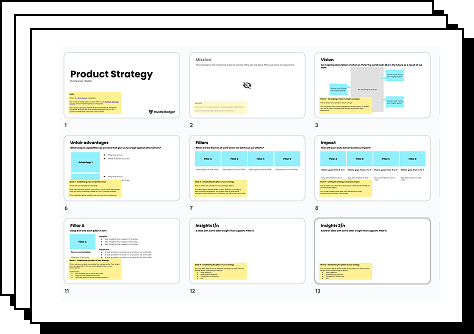This is a summary of a live class on effective job hunting presented by Ed Biden, co-founder of Hustle Badger.
In this job search class we walk you through a series of practical steps to improve your outcomes, and break down job hunting into smaller, actionable steps, to help you get the career next step you’d like.
Job Search Class Contents
Step 1: Determine What You Want
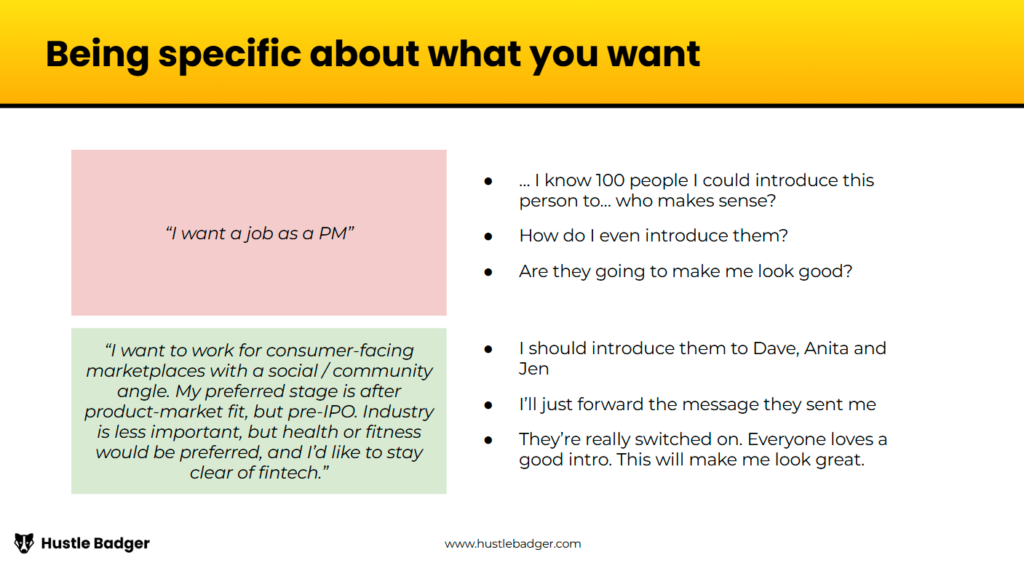
Understanding what you want in your career is crucial for an effective job search. This process involves self-reflection and setting clear goals.
- Assess Your Background: Consider your previous roles, experiences, and education.
- Identify Your Goals: Think about where you see yourself in the future. Do you want to become a CPO, a product coach, or start your own business?
- Bridge the Gap: Your next role should help you transition from where you are to where you want to be.
- Be Specific: Instead of vague statements like “I want a job as a PM,” define your target more clearly, e.g., “I want to work for a consumer-facing marketplace with a community angle.”
Get the Hustle Badger Guide to building a Career Development Plan
Step 2: Polish Your CV and LinkedIn
Your CV and LinkedIn profile are often the first impressions hiring managers have of you. Therefore, they must be polished and tailored.
- Keep It Concise: Aim for a one-page CV. Remove less impressive details to highlight your best achievements.
- Tailor for Each Application: Customize your CV to reflect the job description for roles you care about most.
- Quantify Your Impact: Use numbers to demonstrate your achievements, e.g., “increased revenue by 30%.”
- Use Strong Language: Incorporate power words like “led,” “built,” and “shipped” to convey your contributions effectively.

Check out the Hustle Badger Guide to Writing a PM Resume
Step 3: Build a Portfolio
A portfolio is a valuable tool in showcasing your skills and experiences. It can set you apart from other candidates.
- Keep It Simple: Create an easily accessible portfolio, such as a public Notion page. Include brief descriptions and visuals of your work.
- Highlight Key Projects: Focus on projects that demonstrate your skills and accomplishments relevant to the roles you are pursuing.
- Regular Updates: Update your portfolio regularly to reflect your latest work and achievements.
- Consider Blogging: Writing blog posts on relevant topics can serve as a long-form CV. Share insights from your experiences and thoughts on industry trends.
Step 4: Network Like Crazy
Networking is a vital part of the job search process. Building connections can lead to opportunities that may not be publicly advertised.
- Build a Spreadsheet: Track potential companies and job openings, categorizing them by priority.
- Warm Introductions: Leverage your existing network to get introductions to hiring managers.
- Cold Outreach: Reach out to individuals in your target companies to build connections. Be specific about your request to increase your chances of a response.
- Follow Up: Maintain communication with your contacts to nurture relationships over time.
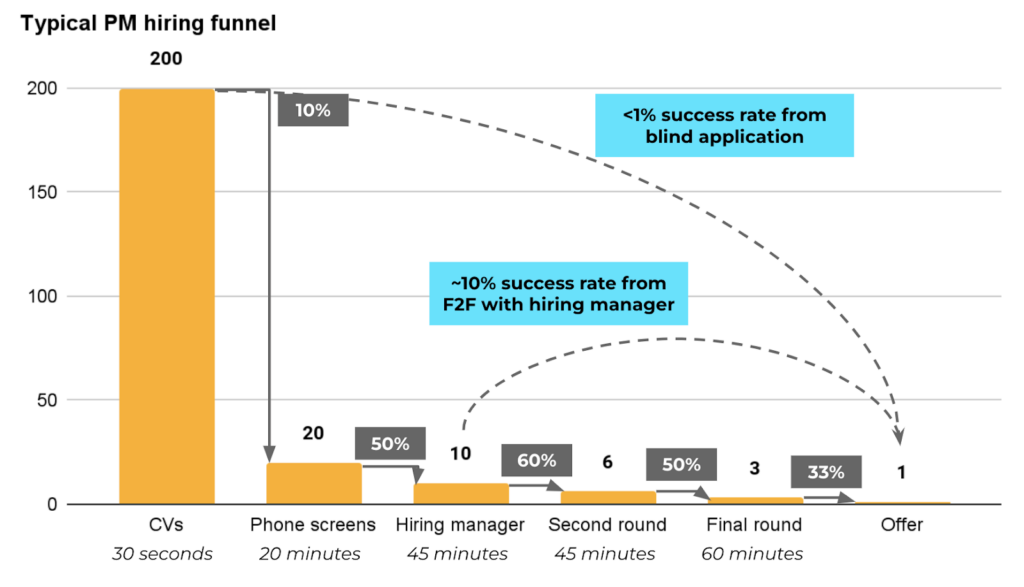
Get the Hustle Badger Guide to How to get a First Round Interview without applying
Step 5: Research Target Companies
Thorough research on target companies helps you tailor your applications and prepares you for interviews.
- Identify Key Players: Look for companies that align with your career goals and values.
- Understand Company Culture: Research their work environment, values, and employee testimonials.
- Stay Updated: Follow industry news and trends related to your target companies. This information can be useful in interviews.
- Prepare Tailored Questions: Formulate questions specific to each company, demonstrating your interest and knowledge during interviews.
Step 6: Conduct an Active Job Search
Engaging in an active job search is essential for success. This involves consistently applying for roles and reaching out to your network.
- Set a Weekly Goal: Aim to apply for a specific number of jobs each week, balancing quality and quantity.
- Use Job Boards and Company Websites: Regularly check platforms like LinkedIn, Glassdoor, and company careers pages for new postings.
- Utilise Alerts: Set up job alerts based on your criteria to stay informed about new opportunities.
- Engage with Recruiters: Connect with recruiters in your industry for potential job leads and insights.
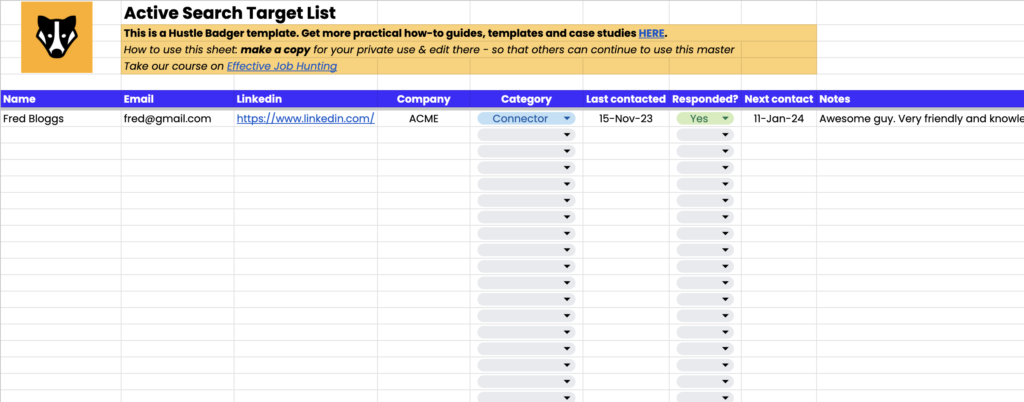
Get our template for running an active search: Google Sheets
Step 7: Research the Role
Understanding the specific role you are applying for is crucial. This preparation enables you to tailor your application and perform better in interviews.
- Analyse the Job Description: Identify key responsibilities and required skills, mapping them to your experience.
- Prepare Questions: Develop insightful questions to ask during interviews, reflecting your understanding of the role.
- Use Online Tools: Leverage resources like LLMs to clarify job requirements and prepare responses.
- Research Company Products: Familiarize yourself with the company’s offerings and market position to demonstrate your interest.
Step 8: Prepare for Interviews
Effective interview preparation can significantly improve your chances of landing the job.
- Practice Common Questions: Prepare answers for frequently asked interview questions, focusing on your experiences and achievements.
- Mock Interviews: Conduct practice interviews with friends or mentors to build confidence.
- Research Interview Formats: Understand the types of interviews you may encounter, such as technical, behavioral, or case interviews.
- Follow-Up: After interviews, send thank-you notes to express your appreciation and reinforce your interest in the position.
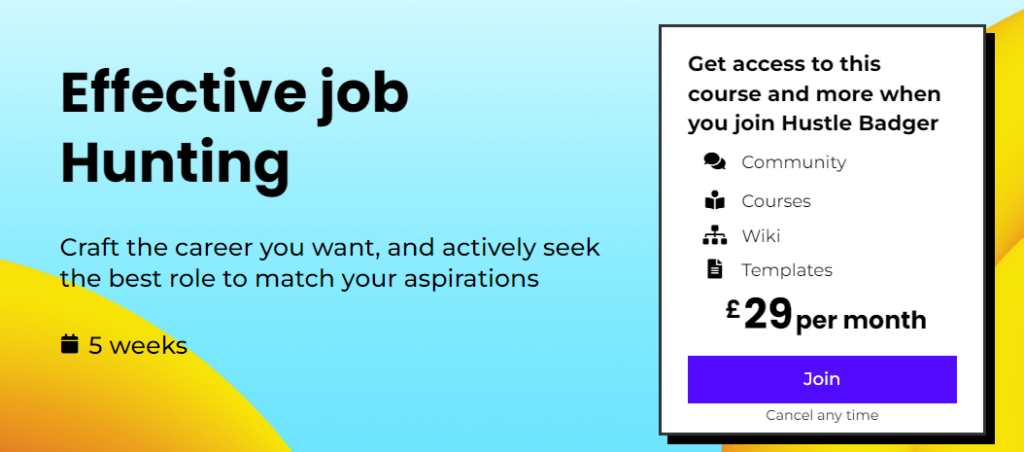
Step 9: Master Interview Techniques
Interviewing effectively requires practice and understanding of common question types.
- Career Narrative: Prepare a compelling story about your career path and why you are applying for the role.
- Product Sense Questions: Be ready to discuss product ideas and your reasoning behind them.
- Metrics and Estimations: Practice estimating market sizes and success metrics during interviews.
- Behavioral Questions: Have structured stories ready that showcase your skills and experiences.
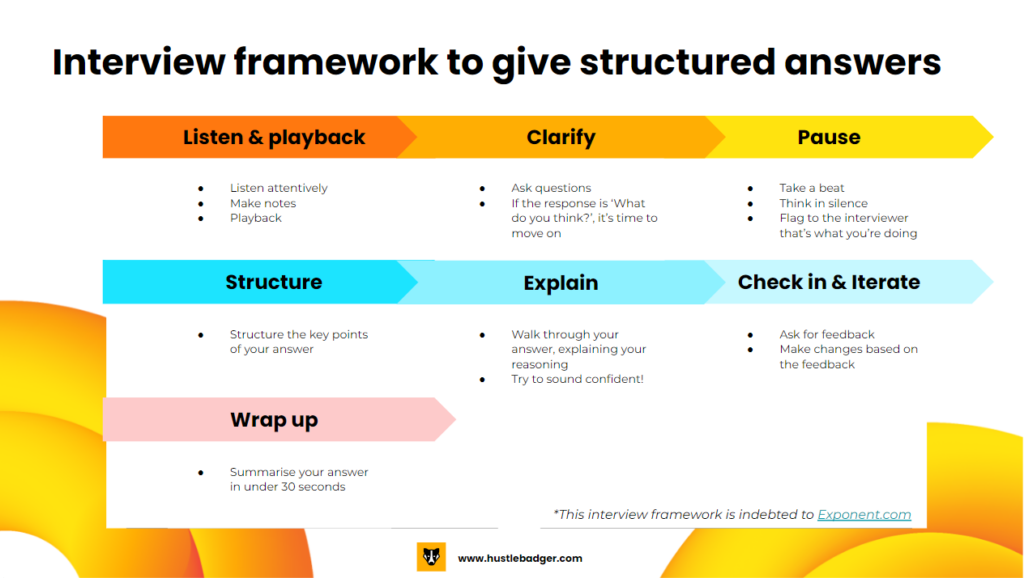
Get the Hustle Badger Guide to answering common Product Manager interview questions
Step 10: Follow Up After Interviews
Following up after interviews is a critical step that many candidates overlook.
- Send Thank-You Notes: Express gratitude for the opportunity and reiterate your interest in the role.
- Request Feedback: Politely ask for feedback on your interview performance to improve for future opportunities.
- Stay Engaged: Maintain contact with interviewers and recruiters to keep yourself top of mind for future openings.
Step 11: Manage Salary Expectations
Understanding and managing salary expectations is crucial during the job search process.
- Research Salary Ranges: Use platforms like Glassdoor and Payscale to understand typical salaries for your role and experience level.
- Align Early: Discuss salary expectations during the initial screening to avoid misunderstandings later.
- Justify Your Worth: Be prepared to explain your value based on skills, experience, and market demand.
- Negotiate Confidently: If you receive an offer below your expectations, leverage other offers or unique skills to negotiate.
Social media can be a powerful tool in your job search. Use it strategically to enhance your visibility.
- Optimize Your Profiles: Ensure your LinkedIn and other social media profiles are up to date and reflect your professional brand.
- Engage with Industry Content: Share articles, comment on posts, and join discussions to increase your presence in your field.
- Network Through Social Media: Connect with professionals in your desired industry and participate in relevant groups or forums.
- Use Hashtags: Utilize industry-specific hashtags to broaden your reach and engage with potential employers.
Connecting with the Hustle Badger community can provide valuable resources and support during your job search.
- Join Events: Participate in community events, workshops, and networking opportunities to meet like-minded individuals.
- Share Your Experiences: Engage in discussions and share your job search journey. You may find others with similar experiences.
- Seek Mentorship: Look for mentors within the community who can provide guidance and support tailored to your career goals.
- Collaborate: Explore opportunities to collaborate on projects or initiatives that can enhance your skills and expand your network.
Check out the Hustle Badger Guide to Finding a Mentor
Continuous Learning and Adaptation
The job market is constantly evolving, making continuous learning essential for success.
- Stay Informed: Keep up with industry trends, new technologies, and best practices relevant to your field.
- Invest in Learning: Consider online courses, workshops, or certifications that can enhance your skill set and make you more marketable.
- Seek Feedback: Regularly ask for feedback from peers and mentors to identify areas for improvement.
- Adapt Your Strategy: Be willing to adjust your job search strategy based on what you learn and the feedback you receive.
Wrap up on the Job Search Class
Even in a tough hiring environment there are actions you can take to make your profile stand out. Be clear on what you want your next role to look like. Tailor your CV accordingly. Invest time in making your CV stand out. Network with purpose. Prepare carefully for interviews.
Best of luck in your job search!
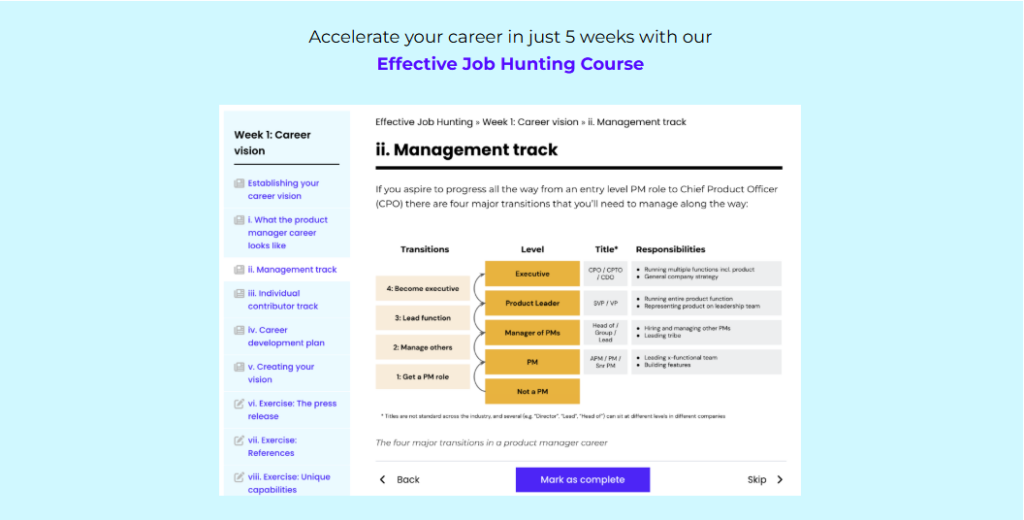
Questions raised in the Job Search Class
How important is a portfolio for job applications?
A portfolio is not mandatory but can significantly enhance your application, especially in creative or technical fields.
Which social media platforms should I focus on when job searching?
LinkedIn is the most important platform, but Twitter and industry-specific forums can also be beneficial.
How can I effectively engage with the Hustle Badger community?
Participate actively in discussions, attend events, and share your experiences to build connections within the community.
What are some effective ways to continue learning during a job search?
Enroll in online courses, attend webinars, and read industry-related books and articles to enhance your knowledge.
How do I stay motivated during a long job search?
Set small, achievable goals and celebrate each milestone. Connecting with others in similar situations can also provide support.
What should I do if I’m not getting responses to my applications?
Review your CV and application strategy. Consider reaching out for feedback from peers or mentors.
How can I improve my networking skills?
Practice your elevator pitch, attend industry events, and engage on platforms like LinkedIn to build connections.
What should I do if I have no references for a job application?
Consider reaching out to former colleagues or supervisors who can vouch for your skills, even if you haven’t worked directly with them in your desired field.
How many applications should I submit weekly?
Quality is more important than quantity. Aim for a balanced approach, focusing on well-researched applications rather than a high volume of generic submissions.
Is it worth investing time in building a personal brand on LinkedIn?
While it can be beneficial, focus on targeted networking and direct outreach instead of trying to build a brand unless you have the time and resources to commit to it
Hustle Badger Resources
Courses
Templates
Articles
Other Resources



